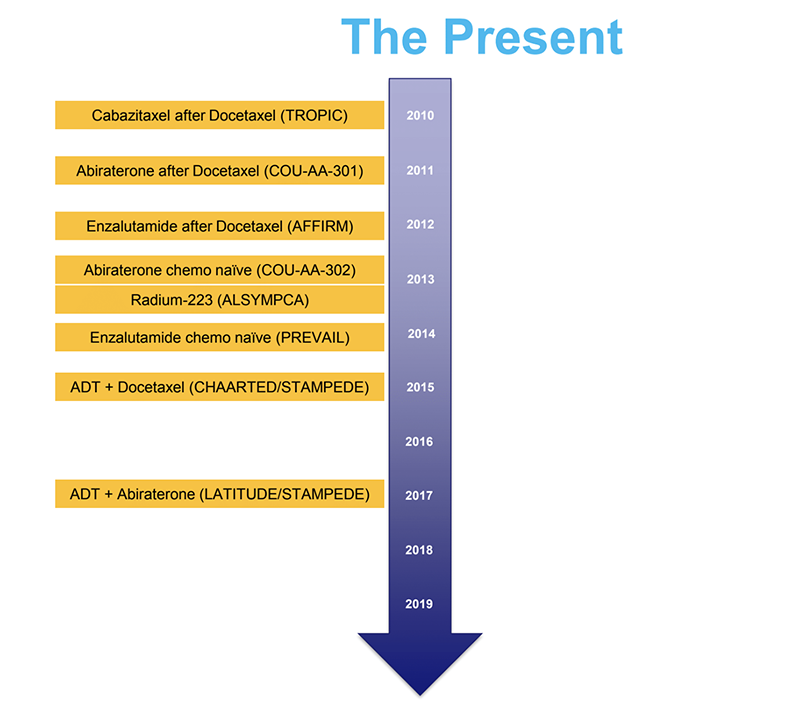When assessing and comparing older and newer cohorts of metastatic prostate cancer patients’ outcomes have improved significantly in the last 10 years, with 5-year overall survival rates increasing from 10% between 2004 and 2007 to 26% between 2010-2013.3
Figure 1- Significant progress in the treatment option for metastatic prostate cancer in the last 10 year:

It is difficult to predict what the future holds in this field, but we can certainly imagine. William Oh, MD, predicts that immunotherapy will gain a substantial role in the treatment of these patients, and that we might even be able to think of the word “cure,” although we are still a long way away. For example, the number of search results for the combination of “cancer” and “cure” in PubMed has risen substantially in past years (Figure 2).
Figure 2 – PubMed citations of the words “cancer” and “cure”:


The standard approach currently used for the treatment of metastatic prostate cancer incorporates monotherapy of one single advanced drug until resistance develops, and then treatment is switched. Some of the analyzed combinations have shown excess toxicity. However, by designing a rapidly-cycling, non-cross-reactive treatment regimen we might be able to:
- Treat intrinsic heterogeneity
- Prevent drug resistance
- Increase long term disease control
- Minimize toxicity
Dr. Oh concluded his talk summarizing some of his personal predictions for the future of metastatic prostate cancer. First, the molecular characterization of tumors will be increasingly relevant as newer targeted drugs are developed. Second, Immunotherapy in metastatic prostate cancer will be more effective. Third, more combination therapies (local and systemic) will be used. Lastly, functional “cures” for metastatic prostate cancer will become more common. Dr. Oh believes that a cure is possible in metastatic prostate cancer if our definition is flexible.
Figure 3: PRINT ongoing study for mCRPC patients:

Presented by: William Oh, MD, Professor, Medicine, Hematology, Urology and Medical Oncology, Mount Sinai Hospital, New York, USA
Written by: Hanan Goldberg, MD, Urology Department, SUNY Upstate Medical University, Syracuse, New York, USA @GoldbergHanan, at the 2019 Advanced Prostate Cancer Consensus Conference (APCCC) #APCCC19, Aug 29 - 31, 2019 in Basel, Switzerland
References:
- Tangen CM, Faulkner JR, Crawford ED, et al. Ten-Year Survival in Patients with Metastatic Prostate Cancer. Clinical Prostate Cancer. 2003;2(1):41-45.
- Klaff R, Berglund A, Varenhorst E, Hedlund PO, Jonler M, Sandblom G. Clinical characteristics and quality-of-life in patients surviving a decade of prostate cancer with bone metastases. BJU international. Jun 2016;117(6):904-913.
- Francini E, Gray KP, Shaw G, et al. Impact of new systemic therapies on overall survival (OS) of patients (pts) with metastatic castration resistant prostate cancer (mCRPC) in a hospital-based registry. Journal of Clinical Oncology. 2018;36(6_suppl):203-203.
Further Related Content: The Future of APC Management in Polymetastatic Disease Presentation


